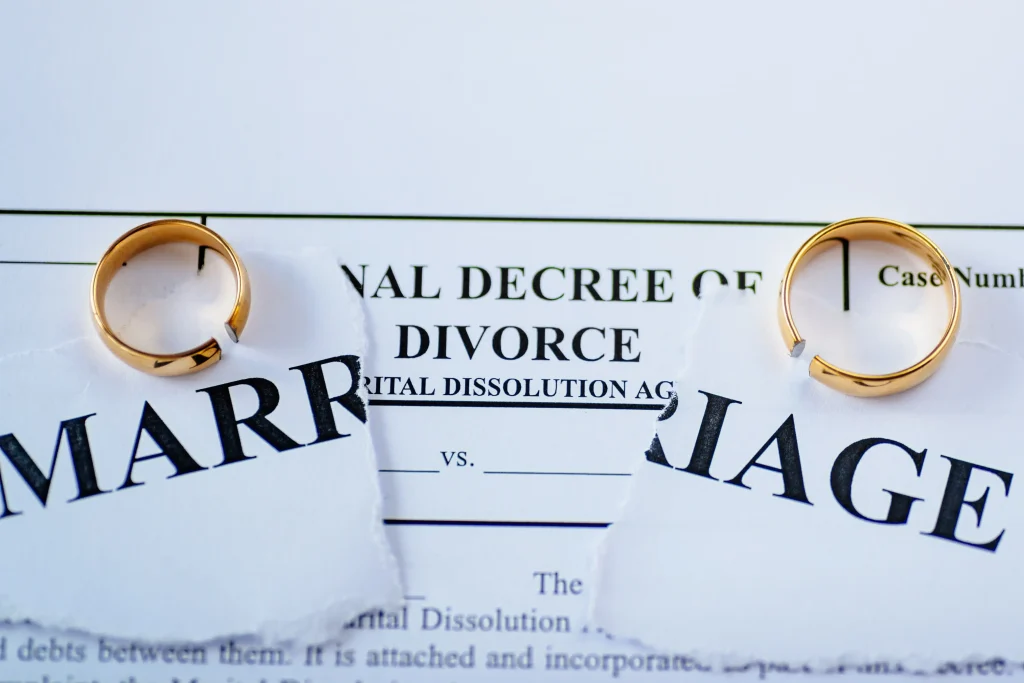 The divorce process often takes a lot of time and energy, and so when it is finally over, and you have orders in place for things like child custody and child support, the last thing you want to do is go back to court. Unfortunately, if your ex-spouse doesn’t comply with court orders, then court involvement may be necessary.
The divorce process often takes a lot of time and energy, and so when it is finally over, and you have orders in place for things like child custody and child support, the last thing you want to do is go back to court. Unfortunately, if your ex-spouse doesn’t comply with court orders, then court involvement may be necessary.
If your ex-spouse isn’t complying with your divorce decree, then you should contact WSM for a free consultation. We will inform you of your rights so that you know exactly where you stand and can gain clarity on your next steps.
Our law firm exclusively represents women in family law matters in Ohio, Indiana, and Texas. Our attorneys have a shared passion for supporting women so that they feel confident about their futures. We are litigation lawyers and will advocate fiercely on your behalf.
We are proud of our approach to family law, which has allowed us to help hundreds of women secure a brighter future. In recent years our law firm has grown, allowing us to support more women while holding onto our personalized approach that allows us to meet our client’s needs.
Arrange a free consultation with a divorce decree and child access enforcement lawyer by calling 380-203-2023.

Refusing to meet the obligations set out in a custody order can create confusion and turmoil in your child’s life, which the order is intended to protect. Therefore, it may be necessary for you to take action to compel your ex-spouse to fulfill their parental obligations.
One option is filing a citation of contempt of court. Your attorney can help you decide whether this is the appropriate action in your case and will support you in evidencing your claims to a Judge. However, before such an action is taken, your attorney can help you to try and resolve your differences outside of court.
The most common types of enforcement include:
If someone is found to be in contempt of court, then possible penalties include fines, jail time, wage garnishment, and other penalties. If your ex-spouse is not complying with the visitation schedule, then the court may first give a warning.
The penalties for being in contempt of court can be severe, which is why it is important to try and work out your issues outside of court first. This can help to protect the relationship between you and your ex-spouse, which ultimately serves your child’s best interests.
However, there are situations where an enforcement order is necessary. If your ex-spouse refuses to cooperate, continually misses visitation, or stops paying child support, then court involvement may be the best option.
When you divorce from your spouse, your divorce decree will assign parental rights and responsibilities. The order will include who is the primary caregiver, visitation schedules, and who has the right to make important decisions in your child’s life.
Parents have a legal obligation to meet the stipulations in their divorce decree; some examples of non-compliance include:

When your child’s other parent fails to meet their parental obligations, it is incredibly frustrating. You could be tempted to stop adhering to the terms of the order yourself either to get back at them or to make your life easier. However, it is important that you continue to comply with the terms of the order so that your ex-spouse does not have any grounds against you.
You should keep a clear record of every instance of missed visitation and every missed child support payment. You should also contact an experienced family law attorney who can support you in finding a resolution.
Noncustodial parents should be given the opportunity to express why the current order is not working, and children benefit from a continued parent-child relationship with both parents. You and your ex-spouse may need to agree upon a new custody arrangement that is more in line with everyone’s schedules. Your attorney can then help you file for a child custody modification with the court.
If your ex-spouse continues to miss visitation, then your attorney can help you to take enforcement action with the court. The court may choose to modify the custody arrangement, find the parent who violated the agreement, or choose a different penalty that the Judge deems appropriate.
As a custodial parent, you may rely on child support to meet your child’s basic needs. If your ex-spouse has failed to comply with a child support order, then you should know that payments never disappear, and they will need to pay what they owe you eventually.
Our first step will be to help you and your ex-spouse mediate an agreement. We believe that it is important to protect your relationship where possible. It is also important to consider why they have missed payments and give them the opportunity to make an arrangement to pay you back. If they are unwilling to cooperate or continue to miss payments, then we will help you take action with the court.
Child support payments do not disappear, which means that they will be made to pay what they owe eventually, and missed child support payments can even be subject to interest.
When a family law Judge is made aware of missed child support payments, child support enforcement actions can include:
When you contact WSM for a free consultation, we will assess your case and offer advice based on your specific circumstances. If you decide to continue with representation, then an experienced family law attorney will dedicate themselves to your case.

The first thing we will do is explore your options for resolving your differences outside of court. That could mean agreeing to a modification to your current order that is more manageable for everyone involved.
If your differences cannot be resolved, then we will help you take the appropriate court action. Our first task will be to closely analyze your orders to determine whether they are enforceable. Sometimes we see cases where our client’s former attorney did not draft the order properly, making it unenforceable.
It is also important that you have been adhering to the terms of your divorce decree if you want to hold the other party accountable for not doing so.
Sometimes it is necessary to go to court to clarify a court order before you can file a motion to enforce a divorce decree. Your attorney will support you in doing this so that you can proceed with filing enforcement.
Once we have established an enforceable order, we will help you file for an enforcement action with the court with jurisdiction over the divorce. The goal is to hold your ex-spouse accountable for failing to comply with a court order.
There will be a court hearing where both sides will be given the opportunity to present evidence and provide testimony. Your family law attorney will prepare you for court and act as your advocate.
Although you can file for enforcement independently, the process is often complex, and we always recommend that women seek advice from a reputable attorney. Enforcing a court order is a serious proceeding that is treated similarly to a criminal case. You need to clearly establish the respondent’s alleged noncompliance by following clear legal procedures and by providing substantial evidence.
Your attorney will clearly law out the specific provisions you need to enforce in your divorce decree or custody orders and will provide clear evidence of noncompliance.
In order to enforce visitation, you need to present your case in a clear and detailed manner. Otherwise, your ex-spouse’s attorney could easily have your case thrown out. The Judge could render it res judicata (“a matter judged”), which means you can’t come back and try it again.
When you have the help of an experienced family law attorney, they will ensure that you have a strong case so that a just decision can be reached.

You should receive child support until a child turns 18, or if they are still in high school education, then it will continue until they are 19. In Indiana, the child support order automatically ends when a child turns 19. However, if your child is dependent on you due to mental or physical incapacity, then a child support order could be in place indefinitely or until the court stops it.
A divorce decree is a civil court order, which means that when someone fails to meet its terms, they are guilty of civil contempt. Police handle criminal contempt and do not protect people from civil wrongs.
If someone has kidnapped or harmed the child, then the police could get involved. However, they cannot enforce a civil wrong, which is the job of the courts.
No. You should not refuse visitation because of missed child support payments. Child support and child custody are separate issues, and if you do this, then you will also be guilty of contempt of court, which will make enforcing a court order more difficult.
The cost of representation for enforcement of a court order varies between cases depending on the complexity. We offer a free consultation so you can speak to a family law attorney and get an idea of what representation could cost before you make a decision.
When a divorce decree has been signed and granted by a Judge and the other parent does not meet their obligations, you may need to take further action. An experienced family law attorney can help you explore all of our options and, if appropriate, will support you in enforcing an order by bringing your case to court.
At WSM, we have a team of family law lawyers that have significant experience dealing with child access enforcement in Ohio, Indiana, and Texas. We understand how frustrating and difficult it can be to raise a child alone, particularly when the other parent does not meet their parental obligations. Our law firm wants to help you in any way we can, whether it is enforcing an order, modifying an order, or offering honest legal advice.
Arrange a free consultation with WSM’s experienced family law lawyers today at 380-203-2023.
Both spouses must agree to a prenup in order for it to be valid. If your spouse does not want a prenup, then you cannot enforce it. One way to help protect your assets is to keep a thorough record of your separate assets.
Yes, it is possible to change or terminate a prenup after marriage. To do so, you will need to enter a new agreement, known as a postnuptial agreement, which alters or invalidates the original prenup. Just like a prenup, a postnup must be agreed upon by both spouses and be legally sound in order for it to be valid.
If you are considering a prenuptial agreement, then it is a good idea to start the process as early as possible. That way, you will have plenty of time to review and amend the agreement to ensure it is valid. The sooner it is complete, the sooner you can start planning the more exciting parts of your wedding!
The cost of a prenup varies widely between cases. When you contact WSM for a free consultation, we can advise you on how much your case is likely to cost.